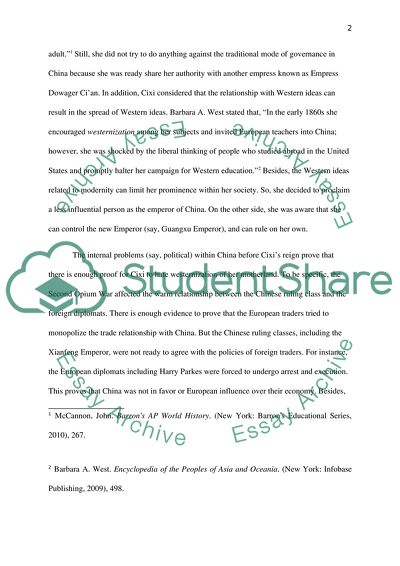Cite this document
(Qing Dynasty Long Road to Modernity during 1860-1910 Affected by Empress Dowager CIXI Essay Example | Topics and Well Written Essays - 2250 words, n.d.)
Qing Dynasty Long Road to Modernity during 1860-1910 Affected by Empress Dowager CIXI Essay Example | Topics and Well Written Essays - 2250 words. https://studentshare.org/history/1869077-qing-dynasty-long-road-to-modernity-during-1860-1910-affected-by-empress-dowager-cixi
Qing Dynasty Long Road to Modernity during 1860-1910 Affected by Empress Dowager CIXI Essay Example | Topics and Well Written Essays - 2250 words. https://studentshare.org/history/1869077-qing-dynasty-long-road-to-modernity-during-1860-1910-affected-by-empress-dowager-cixi
(Qing Dynasty Long Road to Modernity During 1860-1910 Affected by Empress Dowager CIXI Essay Example | Topics and Well Written Essays - 2250 Words)
Qing Dynasty Long Road to Modernity During 1860-1910 Affected by Empress Dowager CIXI Essay Example | Topics and Well Written Essays - 2250 Words. https://studentshare.org/history/1869077-qing-dynasty-long-road-to-modernity-during-1860-1910-affected-by-empress-dowager-cixi.
Qing Dynasty Long Road to Modernity During 1860-1910 Affected by Empress Dowager CIXI Essay Example | Topics and Well Written Essays - 2250 Words. https://studentshare.org/history/1869077-qing-dynasty-long-road-to-modernity-during-1860-1910-affected-by-empress-dowager-cixi.
“Qing Dynasty Long Road to Modernity During 1860-1910 Affected by Empress Dowager CIXI Essay Example | Topics and Well Written Essays - 2250 Words”. https://studentshare.org/history/1869077-qing-dynasty-long-road-to-modernity-during-1860-1910-affected-by-empress-dowager-cixi.


